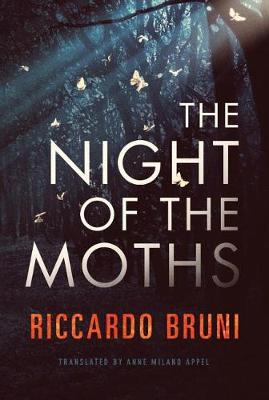Reviewed by Quirky Cat on
The Night of the Moths is a psychological thriller about a murder that had occurred a decade in the past. This is the second of Bruni’s works that have been translated into English (For those of you that can read Italian, there are more of his works out there for you).
I picked Night of the Moths from this month’s Kindle First selections because it was the most interesting one available (sadly there was no science fiction/fantasy choice this month). While the core of the plot was actually pretty interesting, I had a difficult time getting through this novel. It took me about two days (full of starting and stopping) to get through it all.
I think what’s really a shame is just how much potential this novel had. As I said above, the plot itself was perfect – a decade old murder where the supposed murderer is also dead (ironically, by murder) and no new evidence to suggest anything else. The main perspective Enrico, was the boyfriend of the girl who died. Unable to bear with the presence she left in the town or how all the people saw him as “the boyfriend for the girl that died” Enrico fled the town, only coming back 10 years later to finally sell his house. Sounds pretty compelling, doesn’t it?
Unfortunately the writing style is a pretty big turn off. Maybe a lot was lost in translation, I can’t say. It felt like there were a lot of odd phrases and sayings strewn about, frequently and without context. Some terms used were also…off putting. I’m not sure if the author did this intentionally to show the bias of the people around, or if this was his bias showing through (again, I don’t know what words he used originally, so I can’t really say).
Additionally, while I have nothing against multiple points of view (I love them in fact) I am a little fussy about how they’re done. Personally I prefer that the switches in perspective be distinct, either by starting a new chapter or creating a slight break. Something to warn us that the voice has changed. Not doing these results in a few paragraphs of confusion until I figure out that the perspective has switched to another character. Needless to say there were several points where I found myself lost, trying to figure out who was talking or why one character knew something they should not have. It may seem little, but it does a lot to break the immersion in the story (and usually I found myself putting the book down for a break around this point).
I haven’t read any of Bruni’s other works, not even the couple that have been translated into English. So I can’t speak to how well this book was translated or anything like that. I do think Bruni has potential; he just needs to clean up his writing styles a bit (or hire a different translator?). I’d be curious to see what he comes out with next, if nothing else.
For more reviews, check out Quirky Cat's Fat Stacks
Reading updates
- Started reading
- 13 November, 2017: Finished reading
- 13 November, 2017: Reviewed
